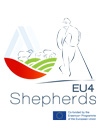Rural areas and social development
|
Course title: |
Rural areas and social development |
|
|
Course code: |
IFRSD |
|
|
ECTS: |
4 |
|
|
In-class hours |
Lectures: |
30 |
|
Laboratory work/Tutorials: |
15 |
|
|
Self-preparation hours |
Practical training: |
20 |
|
Other: |
35 |
|
|
Total hours: |
100 |
|
|
Language: |
English |
|
|
Study cycle: |
BSc, Master, PhD |
|
|
Semester: |
Winter, summer |
|
|
Faculty: |
Faculty of Economics |
|
|
Name of the lecturer(s): |
Chief Assist. Prof. Mariyana Shishkova, PhD |
|
|
Mode of delivery: |
Face-to-face, distance learning |
|
|
Prerequisites: |
Agricultural Economics |
|
|
Learning outcomes of the course unit: |
The EU's rural areas are a vital part of its physical make-up and its identity. According to a standard definition, more than 91 % of the territory of the EU is "rural", and this area is home to more than 56 % of the EU's population. Furthermore, the EU's fantastic range of striking and beautiful landscapes are among the things that give it its character – from mountains to steppe, from great forests to rolling fields. Rural areas in the EU are today confronted with numerous challenges. Those shared with the rest of the society refer to tightened economic conditions, increased volatility in factor and product markets and continuous internationalization of trade, with an expansion of niche markets (eg. ethical trade, geographical brands, specialty products) as a side effect. Other challenges are more specifically affecting rural areas: including the gradual decline of the economic significance of agriculture, increased diversification of the rural economic base, growth in demand for products and services stemming from the positive externalities of land-based activities (most notably agriculture), and the functional transformation of some rural areas from production to consumption spaces. Rural areas also face particular environmental challenges. Added to this, rural society is developing an increasing complexity of social interactions. Consequently, rural governance is shifting from a top-down, subsidy-based model to a broader family of policies designed to improve the competitiveness of rural areas. In policy targeting, one can perceive a shift of development effort towards a multisectoral approach, targeting synergy and complementarity between sectors. With the growing complexity of policies dealing with rural development, particularly concerning support actions for non-agricultural rural employment, or measures targeting non-commodity outputs (e.g. public goods, quality of life), many policy research questions remain unresolved or controversial. The demand for complex, integrated modeling frameworks is increasing. The seminar offers a platform for researchers to express views and exchange experiences on this topic. The subject “Rural areas and social development” aims to provide a comprehensive overview of current theoretical and empirical work dealing with social, economic and policy aspects of rural development. The main proposes of the subject are next: • to introduce participants to a broad range of theoretical and applied knowledge in the field of rural development • to educate participants on the theory and practice of rural development management; • to introduce participants to the range of strategies that address social, economic and personal/group needs in rural areas; • to create a third level educational pathway for the further professional qualification in rural development; The subject “Rural areas and social development” will focus on the following topics: - changing and increasingly complex of rural governance models and approaches, - paradigm shift and new approaches in rural development policy design and delivery, - rural livelihoods and structural change – socioeconomic aspects and methods applicable to rural areas, tools for evaluating rural development policies. Experts from a wide range of economic disciplines (eg. development policy, economic modeling, regional economics, political economy, environmental and resource economics, institutional economics) are invited to provide state of the art papers addressing any of the above-listed topics, singly or in combination. Expected topics to be addressed by the papers are likely to bear a direct relevance also for policymakers dealing with rural development. The seminar aims to contribute towards the enhancement of frameworks and tools for rural policymaking, including better targeting, and better monitoring of rural development programmes in the future. |
|
|
Course contents: |
1. Introduction to Rural development 2. The Driving Forces Behind Rural Change 3. Social and Economic Changes 4. Environmental Changes 5. Approaches to Rural Development in Europe 6. General Concepts for Rural Development 7. Policy Development at EU Level 8. Different Perspectives at National Level 9. Instruments and Structures for Delivering Rural Development 10. The European Rural Development Framework 11. Institutions Responsible for Rural Development 12. Rural Development Objectives 13. The Role of the Environment in Rural Development 14. Social Values in Rural Development: Consultation, Partnership and Participation 15. Rural-urban Interface 16. Policy Delivery, Resources and Administration 17. Factors Hindering Effective Policies 18. Integrated Rural Development 19. Examples of Progress towards Sustainable Rural Development 20. Next Steps to Rural Development in Europe 21. References and National Reports |
|
|
Recommended or required reading: |
1. Lowe P., Ray C., Ward N., Wood D., Woodward R. (1998) Participation in Rural Development: A Review of European Experience, CRE Press, University of Newcastle upon Tyne; 2. Ray C.,(2001) Culture Economies – A perspective on local rural development in Europe, CRE Press, University of Newcastle upon Tyne; 3. M Rizov, “Rural development perspectives in enlarging Europe: The implications of CAP reforms and agricultural transition in accession countries” European Planning Studies, 14, 2 (2006) 219-238. |
|
|
Planned learning activities and teaching methods: |
The main part of the material in EU Rural Development Policy is taught by lectures. During the tutorials the students solve cases related to the lectures’ material. To illustrate the process of decision making, a "game" approach will be used, where the students are given certain roles and are required to decide on allocation of resources. |
|
|
Assessment methods and criteria: |
Participation in class discussions-20% Interim exams- 30% Final written exam- 50% |
|
|
Course title: |
Rural Areas and Social Development |
|
|
Course code: |
IFRSD |
|
|
ECTS: |
4 |
|
|
In-class hours |
Lectures: |
30 |
|
Laboratory work/Tutorials: |
15 |
|
|
Self-preparation hours |
Practical training: |
20 |
|
Other: |
35 |
|
|
Total hours: |
100 |
|
|
Language: |
English |
|
|
Study cycle: |
BSc, Master, PhD |
|
|
Semester: |
Winter, summer |
|
|
Faculty: |
Faculty of Economics |
|
|
Name of the lecturer(s): |
Chief Assist. Prof. Mariyana Shishkova, PhD |
|
|
Mode of delivery: |
Face-to-face, distance learning |
|
|
Prerequisites: |
Agricultural Economics |
|
|
Learning outcomes of the course unit: |
The EU's rural areas are a vital part of its physical make-up and its identity. According to a standard definition, more than 91 % of the territory of the EU is "rural", and this area is home to more than 56 % of the EU's population. Furthermore, the EU's fantastic range of striking and beautiful landscapes are among the things that give it its character – from mountains to steppe, from great forests to rolling fields. Rural areas in the EU are today confronted with numerous challenges. Those shared with the rest of the society refer to tightened economic conditions, increased volatility in factor and product markets and continuous internationalization of trade, with an expansion of niche markets (eg. ethical trade, geographical brands, speciality products) as a side effect. Other challenges are more specifically affecting rural areas: including gradual decline of the economic significance of agriculture, increased diversification of the rural economic base, growth in demand for products and services stemming from the positive externalities of land-based activities (most notably agriculture), and the functional transformation of some rural areas from production to consumption spaces. Rural areas also face particular environmental challenges. Added to this, rural society is developing an increasing complexity of social interactions. Consequently, rural governance is shifting from a top-down, subsidy-based model to a broader family of policies designed to improve the competitiveness of rural areas. In policy targeting, one can perceive a shift of development effort towards a multisectoral approach, targeting synergy and complementarity between sectors. With growing complexity of policies dealing with rural development, particularly concerning support actions for non-agricultural rural employment, or measures targeting non-commodity outputs (e.g. public goods, quality of life), many policy research questions remain unresolved or controversial. The demand for complex, integrated modelling frameworks is increasing. The seminar offers a platform for researchers to express views and exchange experience on this topic. The subject “Rural areas and social development” aims to provide a comprehensive overview of current theoretical and empirical work dealing with social, economic and policy aspects of rural development. The main proposes of the subject are next: • to introduce participants to a broad range of theoretical and applied knowledge in the field of rural development • to educate participants on the theory and practice of rural development management; • to introduce participants to the range of strategies that address social, economic and personal/group needs in rural areas; • to create a third level educational pathway for the further professional qualification in rural development; The subject “Rural areas and social development” will focus on the following topics: - changing and increasingly complex of rural governance models and approaches, - paradigm shift and new approaches in rural development policy design and delivery, - rural livelihoods and structural change – socioeconomic aspects and methods applicable to rural areas, tools for evaluating rural development policies. Experts from a wide range of economic disciplines (eg. development policy, economic modelling, regional economics, political economy, environmental and resource economics, institutional economics) are invited to provide state of the art papers addressing any of the above listed topics, singly or in combination. Expected topics to be addressed by the papers are likely to bear a direct relevance also for policymakers dealing with rural development. The seminar aims to contribute towards the enhancement of frameworks and tools for rural policy making, including better targeting, and better monitoring of rural development programmes in the future. |
|
|
Course contents: |
1. Introduction to Rural development 2. The Driving Forces Behind Rural Change 3. Social and Economic Changes 4. Environmental Changes 5. Approaches to Rural Development in Europe 6. General Concepts for Rural Development 7. Policy Development at EU Level 8. Different Perspectives at National Level 9. Instruments and Structures for Delivering Rural Development 10. The European Rural Development Framework 11. Institutions Responsible for Rural Development 12. Rural Development Objectives 13. The Role of the Environment in Rural Development 14. Social Values in Rural Development: Consultation, Partnership and Participation 15. Rural-urban Interface 16. Policy Delivery, Resources and Administration 17. Factors Hindering Effective Policies 18. Integrated Rural Development 19. Examples of Progress towards Sustainable Rural Development 20. Next Steps to Rural Development in Europe 21. References and National Reports |
|
|
Recommended or required reading: |
1. Lowe P., Ray C., Ward N., Wood D., Woodward R. (1998) Participation in Rural Development: A Review of European Experience, CRE Press, University of Newcastle upon Tyne; 2. Ray C.,(2001) Culture Economies – A perspective on local rural development in Europe, CRE Press, University of Newcastle upon Tyne; 3. M Rizov, “Rural development perspectives in enlarging Europe: The implications of CAP reforms and agricultural transition in accession countries” European Planning Studies, 14, 2 (2006) 219-238. |
|
|
Planned learning activities and teaching methods: |
The main part of the material in EU Rural Development Policy is taught by lectures. During the tutorials the students solve cases related to the lectures’ material. To illustrate the process of decision making, a "game" approach will be used, where the students are given certain roles and are required to decide on allocation of resources. |
|
|
Assessment methods and criteria: |
Participation in class discussions-20% Interim exams- 30% Final written exam- 50% |
|
 - Events on the occasion of the 80th anniversary of AU
- Events on the occasion of the 80th anniversary of AU











